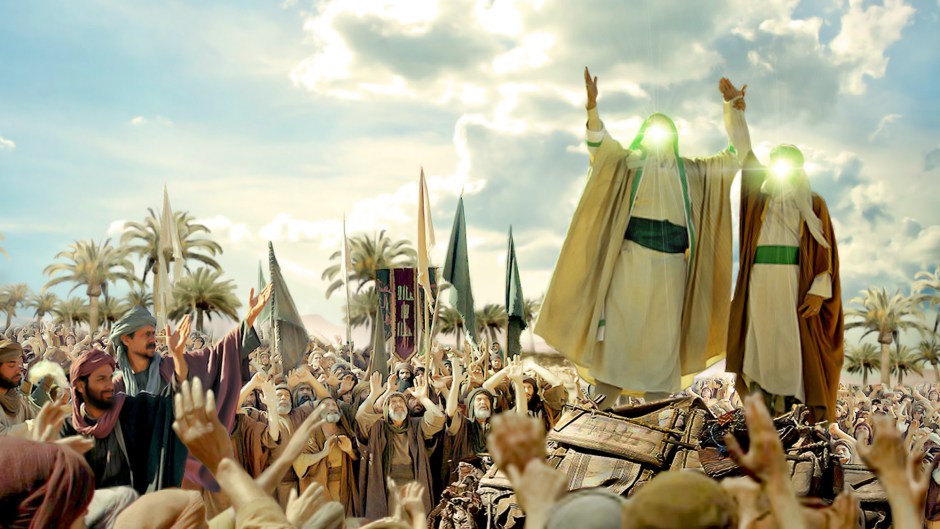

What is the Reason Behind Worldly Sufferings According to Islam?
All of us go through hardships and calamities that are not pleasing to us. We have all experienced moments and days of sorrow and suffering; be it one or more of the natural disasters, the loss of health or wealth, the loss of one of our dear ones, or even simpler issues that we face in our everyday life. The number of people who do not complain while they are suffering an incident is very few. Sometimes the calamities are so huge that they put us under severe pressure and take us to the point where we start complaining to Allah and asking Him the famous “why” question: “Why should this happen to me? Why don’t you help me overcome my problem? Why does this suffering seem everlasting?”
If you are one of those who have happened to ask these questions from Allah in specific situations, then this article might be useful to you and to myself, as it tries to answer all the above questions based on the words of Allah and the Islamic traditions.
Worldly suffering in the Quran
We may be surprised in reading the verse of the Quran in which Allah (SWT) says:
“Certainly We created man in travail.” (90: 4)
Why would He do such a thing to us? Was He going to take revenge on us for something? Or does He enjoy seeing us suffering?
The fact is that all different types of problems, sorrows, losses, and sufferings can be looked at from two different perspectives. If one looks at problems and calamities only from a materialistic perspective, one may be able to find a material reason for each; For example, the drought is caused by the lack of rain, the disease is caused by poor hygiene and bankruptcy is a sign of lack of business awareness. But from the Islamic viewpoint, there are several factors influencing these events and disasters only some of which are considered material causes.
Allah tests us
One of the wisdom behind worldly sufferings according to the verses of the Quran is that Allah tests His servants with hardships and calamities, and in this test only those who are patient are victorious:
“We will surely test you with a measure of fear and hunger and a loss of wealth, lives, and fruits; and give good news to the patient.” (2: 155)
It is noteworthy that there is no problem in mourning for our sorrows, feeling down, and even crying over them. We are all human beings, flesh, and blood, and sometimes we feel so burdened by the difficulties of life that we find it hard to bear. Yet one should be wary not to blame Allah for these sufferings and turn his/her back to Him. Instead, we should find the capacity to submit to the fate destined for us by Allah, believing in the fact that Allah is the only One who can save us from these calamities and would never do injustice to us. These are the times we should get closer to Allah and rely on His mercy and help.
But, why would Allah need to test His servants? He mentions in a verse of the Quran that being faithful is not accepted in words only, and to prove one’s faith, he/she should go through different tests:
“Do the people suppose that they will be let off because they say, ‘We have faith,’ and they will not be tested? Certainly, We tested those who were before them. So Allah shall surely ascertain those who are truthful, and He shall surely ascertain the liars.” (29: 2-3)
It is not for Allah (SWT) to find out if we are real believers or not, but by putting us through tests He allows us to see the real level of our faith and try to improve it or leave it as it is.
Therefore, one can conclude that the divine test is performed to separate and recognize the truthful from the false claimants and to make the believers pure. The higher the level of our faith goes the harder the tests become.
Saving human’s faith
Another reason behind worldly sufferings according to Islamic teachings is that Allah (SWT) wants to save and strengthen His servant’s faith. Prophet Muhammad (PBUH&HP) narrated from Gabriel from Allah that:
“Among my faithful servants, there are some whose faith is not amended except by poverty and destitution, and if I make him rich, this wealth will corrupt and destroy his faith. And among my believing servants, there is one whose faith is not corrected except by wealth, and if I make him poor, poverty and misery will corrupt and destroy his faith. ... I guide them by the knowledge that I have of the hearts of my servants. It is true that I am Wise and Knowledgeable.” [1]
Therefore, there are many things that happen to us by the will of Allah which may not be pleasing to us and we may interpret them as sufferings while at the heart of them are great blessings for us:
“… may be that you dislike something, which is good for you, and it may be that you love something, which is bad for you, and Allah knows and you do not know.” (2: 216)

Warning from Allah
Sometimes we are so pleased and drowned in the blessings that Allah (SWT) has provided us that we totally forget our mission and goal of living in this world. In these moments Allah (SWT) tests us with some calamities and puts us through some sufferings to remind us of our goal and warn us about the consequences of neglecting our mission. These little sufferings as mentioned in the Quran are the ones that keep us away from the harder sufferings:
“We shall surely make them taste the nearer punishment prior to the greater punishment, so that they may come back.” (32: 21)
To bring us closer to Allah
Another important reason behind worldly sufferings is that these types of things show the human being how weak he is and how needy he is toward his Lord. It is at the time of suffering that we realize there is nothing we can do to solve the problems and we turn to Allah to ask Him for help.
Allah (SWT) mentions this point in the Quran in different verses:
“When distress befalls you at sea, those whom you invoke besides Him are forsaken. But when He delivers you to land, you are disregardful [of Him]. And man is very ungrateful.” (17:67)
Therefore, hardship and suffering cause us to remember that He is the only One who can help us, thus we turn to Him.
Compensation for our sins
According to Islamic teachings, worldly sufferings are also a way by which Allah (SWT) makes up our mistakes and sins. It is narrated from Prophet Muhammad (PBUH&HP) that:
“The sorrows, sicknesses, and sufferings that befall on a believer are the means of wiping away his/her sins by Allah.” [2]
However, sometimes these sufferings are not to compensate for our sins. We have all seen or heard that sometimes some of the very faithful servants of Allah face huge sufferings. These types of suffering according to Islamic teachings is to elevate the spiritual or even the material capacities of human beings.
References:
- Shaikh Sadough: Al-tawheed. (1398 A.H.), p. 400
- Ali bin al-Husain bin Shu’ba al-Harrani, Tuhaf al-Uqul, p.38.
Share This Article

Ghadir Narrations part 2
21- Day of greetings
Imam Sadiq (AS) said:
The value of deeds on that day (Eid Ghadir) is equal to eighty months, and it is recommended to increase the remembrance of Allah and Salawat upon the Prophet (PBUH&HP) and his family.
22- The day of the leadership meeting
Imam Hadi (AS) said to Abu Ishaq:
On the day of Ghadir, the Holy Prophet (PBUH&HP) raised the hand of his brother Ali (AS) and introduced him as the flag bearer (and commander) of the people and the leader after him. Abu Ishaq said: I said, I beg your pardon, you are right. That is why I came to visit you, I testify that you are the authority of Allah over the people.
23- Takbir Day
Imam Reza (AS) said:
Whoever meets a believer on the day (Ghadir), Allah will send seventy lights on his grave and expand his grave, and every day seventy thousand angels will visit his grave and give him the good news of Paradise.
24- Day of meeting and goodness
Imam Sadiq (AS) said:
It is proper to get closer to Allah by doing good to others, fasting, praying, reaching out to relatives, and meeting the brothers of faith because the prophets did so and advised their people when they appointed their successors.
25- Prayer in Ghadir Mosque.
Imam Sadiq (AS) said:
It is recommended to pray in Ghadir Mosque because the Holy Prophet (PBUH&HP) introduced and appointed the Commander of the Faithful (AS) there. And that is where the great Allah revealed the truth.
26- Ghadir day prayer
Imam Sadiq (AS) said:
A person who prays two units (Rakat) at any time on the day of Eid Ghadir -and it is better to be close to noon, which is the time when the Commander of the Faithful (AS) was appointed leadership in Ghadir at that time- is like someone realized that day ...
27- Ghadir fast
Imam Sadiq (AS) said:
The fast of Ghadir day is equal to the fast of the whole life. That is if a person is always alive and fasts all his life, his reward is equal to the reward of fasting on Eid Ghadir.
28- Congratulations and smile day
Imam Reza (AS) said:
Eid Ghadir is a day of congratulations. Congratulations to each other, every time a believer meets his brother, he should say: "Praise be to Allah who has given us the success of grasping the guardianship of Imam Ali (AS) and the leaders." ...
Chapter 3: Guardianship in Ghadir
29- The Prophet and the guardianship of Ali (AS)
On the day of Ghadir, the Messenger of Allah (PBUH&HP) ordered: A preacher should call: Gather for prayer. Then he took the hand of Ali (AS), raised it and said:
O Allah, whoever I am the master of, so Ali is also his master, O Allah, love the one who loves Ali and be the enemy of the one who is at enmity with Ali.
30- Prophetic life
The Messenger of Allah (PBUH&HP) said:
Whoever wants to live and die like me and live in the eternal paradise that my Lord has promised me, will choose the guardianship of Ali ibn Abi Talib (AS), because he leads you not astray.
31- The Prophet and Imamate of Ali (AS)
I heard the Messenger of Allah (PBUH&HP) to say to Ali ibn Abi Talib (AS):
O Ali, you are my brother, guardian, heir and successor among my ummah during my life and after my death. Your friend is my friend and your vindictive is my enemy.
32- The foundations of Islam
Imam Baqir (AS) said:
Islam is based on five pillars: prayer, zakat, fasting, Hajj and Wilayah (Guardianship), and nothing has been called as much as what has been emphasized to Wilayah on the Day of Ghadir.
33- Immortal province
Imam Kadhim (AS) said:
The guardianship of Ali (AS) is recorded in the books of all the prophets and no prophet was sent except with the covenant of the prophethood of Muhammad (PBUH&HP) and the Imamate of Ali (AS).
34- Wilayah and Tawhid
The Messenger of Allah (PBUH&HP) said:
The guardianship of Ali (AS) is the guardianship of Allah, loving him is worshiping Allah, following him is a divine obligation and his friends are friends of Allah and his enemies are enemies of Allah, war with him, war with Allah, and peace with him, peace with Allah Almighty.
35- The day of the devil's wailing
Imam Baqir (AS) said:
Satan, the enemy of Allah, lamented four times: the day he was cursed by Allah, the day he fell to the ground, the day that Holy Prophet (PBUH&HP) was sent, and the day of Eid Ghadir.
36- Tawhid fort
The Holy Prophet (PBUH&HP) said:
God says: The guardianship of Ali is my stronghold, so whoever enters my fortress will be protected from the fire of Hell.
37- The successor of the Prophet
The Messenger of Allah (PBUH&HP) said:
O Ali, I am the city of knowledge and you are its door, do not enter the city except through its door. ... You are the leader of my nation and my successor in this city, whoever obeys you is blessed, and whoever disobeys you is miserable, and your friend has benefited and your enemy has lost.
38- Islam in the shadow of the province
Imam Sadiq (AS) said:
The cornerstones of Islam are three things:
Prayer, Zakat and Wilayah, none of which can be made without the other.
39- Ten thousand witnesses
Imam Sadiq (AS) said:
O Hafs! Surprising of what Ali (AS) encountered! He could not get his right with ten thousand witnesses (on the day of Ghadir), while a person with two witnesses gets his right.
40- Ali (AS), the commentator of the Quran
The Holy Prophet (PBUH&HP) said on the day of Ghadir:
Ali (AS) is the interpretation of the Book of Allah, and the inviter to Allah, be aware that what is lawful and what is forbidden is more than what I introduce and command and forbid and count them. So I was instructed to make a covenant with you to accept what I brought from Allah Almighty about Ali the commander of the faithful and his successors.
O people! Think and understand the divine revelations, pay attention to its courts and do not follow its similarities. I swear by Allah, no one can ever utter the verses of the Qur'an and clarify its interpretation, except the one whom I have taken (and introduced).
Read More

40 Absorbing Imam Hasan al-Mujtaba (AS) Quotes
1. How to Treat People
Treat people the way you like to be treated.
Hasan ibn Muhammad Deilami, Aalam al-din fi Sifat al-Moumenin, p.297.
2. Good Temper
The best of virtues is being good-tempered.
al-Shaykh al-Saduq, Al-Khisal (The Traits), p.29.
3. Serving Allah in Imam Hasan (AS)'s View
Whoever serves Allah sincerely, Allah will make all the universe serve him/her.
Warram b. Abi Firas al-Hilli, Tanbih al-khawatir wa nuzhat al-nawazir , vol.2, p.108.
4. Giving Thanks
The one who doesn't give thanks for his/her blessings is a worthless person.
Ibn Shu'ba al-Harrani, Tuhaf al-'uqul, p. 233.
5. The Month of Ramadan
Allah has made the month of Ramadan like a competition for His servants, to compete for His satisfaction with each other through obeying Him.
Ibn Shu'ba al-Harrani, Tuhaf al-'uqul, p.236.
6. Your Neighbor
Treat your neighbor kindly to be worthy of being a Muslim.
al-'Allama al-Majlisi, Bihar al-anwar, vol.78, p.112.
7. Think and Contemplate
I advise you to think and contemplate since they enliven an insightful person's heart and are the key to wisdom.
Hasan ibn Muhammad Deilami, Aalam al-din fi Sifat al-Moumenin, p.297.
8. Consulting in Imam Hasan (AS)'s Words
Consulting in groups leads you toward success.
Ibn Shu'ba al-Harrani, Tuhaf al-'uqul, p.233.
9. A True Friend
A true friend is always on your side, whether in hardships or comforts.
al-'Allama al-Majlisi, Bihar al-anwar, vol.78, p.114.
10. The Meaning of Patience according to Imam Hasan (AS)
Patience means restraining from anger and having yourself under control.
Ibn Shu'ba al-Harrani, Tuhaf al-'uqul, p.227.
11. Your Creation is Not Vain
O' servants of Allah, beware that Allah had not created you in vain, nor left you on your own. Instead, He had determined the years of your lives and has distributed your sustenance among you. This way, any wise person will realize his/her worth and that he/she won't get more than what has been determined for him/her.
Ibn Shu'ba al-Harrani, Tuhaf al-'uqul, p.234.
12.This Life and the Life that Is to Come
Strive for this life as if you will live forever, and make every effort for the life that is to come as if you will die the next day.
Muhammad Reza, Ali and Muhammad Hakimi, Al-Hayat (Life), vol.4, p.62.
13. A Reflection on this World by Imam Hasan (AS)
This world is the dwelling of pain and hardship, and whatever rests here is doomed to mortality. Allah had informed us of this world's workings to learn our lessons from it. He has warned us beforehand so that no excuse will remain at the end for us. Therefore, be pious in dealing with what is temporal (i.e., this world) and seek what is eternal (the afterlife).
Muhammad b. 'Ali b. Shahrashub, Manāqib Āl Abī Ṭālib, vol.4, p.31.
14. The Quran
Verily, the lights of guidance in this Quran leads toward prosperity. This Quran heals hearts and souls.
al-'Allama al-Majlisi, Bihar al-anwar, vol.75, p.11.
15. The Right and Wrong
There is a thin line between what is right and wrong; what you see with your own eyes is the right thing, and what you hear or is told about might be wrong.
Ibn Shu'ba al-Harrani, Tuhaf al-'uqul, p.229.
16. Be Grateful
Being grateful for the blessings and being patient in hardships, are the virtues to which you can't find any negative side.
Ibn Shu'ba al-Harrani, Tuhaf al-'uqul, p.234.
17. Your Religion
Verily, people are slaves to this world and its wealth and make their religion a means of reaching their (worldly) purposes and do whatever it takes to build an ideal life. Therefore, when faced with a trial, few will adhere to their religions.
Qadi Nur Allah Shushtari, Ihqaq al-haqq, vol.11, p.234.
18. Know Allah
Whoever knows Allah, will fall in love with Him.
Warram b. Abi Firas al-Hilli, Tanbih al-khawatir wa nuzhat al-nawazir, vol.1, p.52.
19. The Blessings
The blessings are unappreciated as long as they are at hand, yet their worth will be appreciated as soon as they are lost.
al-'Allama al-Majlisi, Bihar al-anwar, vol.78, p.115.
20. Meanness
Meanness is considering what you own as the reason for your honor, and what you give away as waste.
Ibn Shu'ba al-Harrani, Tuhaf al-'uqul, p.225.
21. Poverty
Poverty is the greed that is not satisfied with anything.
Ibn Shu'ba al-Harrani, Tuhaf al-'uqul, pp.225&226.
22. Ponder as Imam Hasan (AS) Says
I advise you to piety and constant pondering since thinking is the root of all virtues.
Warram b. Abi Firas al-Hilli, Tanbih al-khawatir wa nuzhat al-nawazir, vol.1, p.52.
23. The Ability to Supplicate
When Allah blesses someone with the ability to supplicate to Him, He surely gives his/her prayers the chance of being granted.
al-'Allama al-Majlisi, Bihar al-anwar, vol.78, p.113.
24. An Unnecessary Burden
Expressing your opinion on the subject, which is not related to you, puts an unnecessary burden on your shoulders.
Ibn Shu'ba al-Harrani, Tuhaf al-'uqul, p.226.
25. The Sign of Abasement
Being afraid of honesty and expressing the truth is a sign of abasement.
Ibn Shu'ba al-Harrani, Tuhaf al-'uqul, p.226.
26. Three Destructive Things in Imam Hasan (AS)'s Words
There are three things that bring destruction to people; pride, greed, and envy.
al-'Allama al-Majlisi, Bihar al-anwar, vol.78, p.111.
27. The Best Chance to Forgive
The best chance for a benevolent person to forgive a guilty one is when there is no way out for the latter.
Hasan ibn Muhammad Deilami, Aalam al-din fi Sifat al-Moumenin, p.297.
28. The Spirit of Generosity
Whoever counts the number of his/her charities, ruins his/her spirit of generosity.
al-'Allama al-Majlisi, Bihar al-anwar, vol.78, p.113.
29. The Eyes and the Ears
The most insightful eyes are the ones that are fixed only on the goodness and virtues, and the most receptive ears are the ones who listen to advice and make use of them.
al-'Allama al-Majlisi, Bihar al-anwar, vol.78, p.109.
30. Silence, Recommended by Imam Hasan (AS)
At times, silence is a better companion, even if you are a perfect speaker.
al-Shaykh al-Saduq, Ma'ani l-Akhbar, section no.401. Hadith no. 62.
31. The Calamities
The calamities are the keys to blessings and rewards.
Hasan ibn Muhammad Deilami, Aalam al-din fi Sifat al-Moumenin, p.297.
32. Worshiping Allah
Whoever seeks to worship [Allah] sincerely, should purify him/herself for this purpose.
Ibn Shu'ba al-Harrani, Tuhaf al-'uqul, p.236.
33. A Precious Wealth
No wealth is more precious than wisdom.
Baha' al-Din 'Ali b. 'Isa al-Irbili, Kashf al-ghumma fi ma'rifat al-a'imma, vol.2, p.198.
34. Wisdom
Treating people good-manneredly is a crucial part of wisdom.
al-'Allama al-Majlisi, Bihar al-anwar, vol.78, p.111.
35. Teach
Teach your knowledge to others and learn what others know; this way, you will both improve your own knowledge and learn what you didn't know about.
Baha' al-Din 'Ali b. 'Isa al-Irbili, Kashf al-ghumma fi ma'rifat al-a'imma, vol.2, p.197.
36. Food for Thought
I wonder how you would think about the food for your body and don't contemplate on the food for your thought? You restrain from eating what is harmful to your body, but fill your mind and soul with what ruins them.
al-'Allama al-Majlisi, Bihar al-anwar, vol.1, p.218.
37. Anger
Your [real] thoughts will be revealed in your anger.
al-'Allama al-Majlisi, Bihar al-anwar, vol.78., p.113.
38. Allah's Satisfaction
I guarantee that Allah will grant the prayers of the one whose only purpose is Allah's satisfaction.
al-'Allama al-Majlisi, Bihar al-anwar, vol.43. , p.351.
39. Trust Allah
Whoever trusts Allah's best intention, will only desire what Allah chooses for him/her.
al-'Allama al-Majlisi, Bihar al-anwar, vol.78., p.106.
40. Alms-Tax
Giving alms-tax (Zakat) does not reduce your wealth.
al-'Allama al-Majlisi, Bihar al-anwar, vol.96., p.23.
Read More

